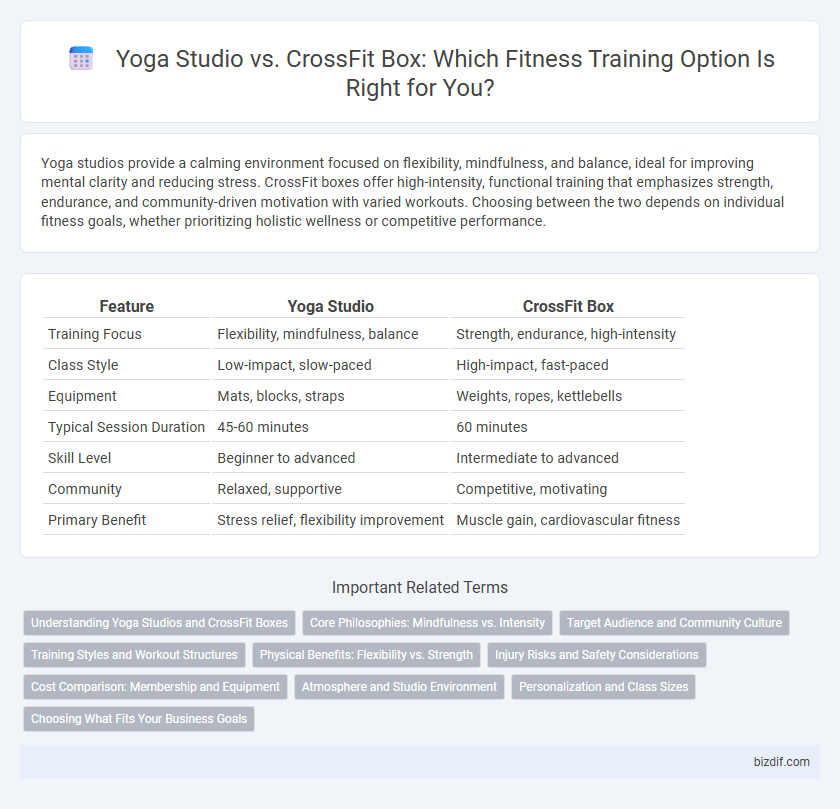Yoga studios provide a calming environment focused on flexibility, mindfulness, and balance, ideal for improving mental clarity and reducing stress. CrossFit boxes offer high-intensity, functional training that emphasizes strength, endurance, and community-driven motivation with varied workouts. Choosing between the two depends on individual fitness goals, whether prioritizing holistic wellness or competitive performance.
Table of Comparison
| Feature | Yoga Studio | CrossFit Box |
|---|---|---|
| Training Focus | Flexibility, mindfulness, balance | Strength, endurance, high-intensity |
| Class Style | Low-impact, slow-paced | High-impact, fast-paced |
| Equipment | Mats, blocks, straps | Weights, ropes, kettlebells |
| Typical Session Duration | 45-60 minutes | 60 minutes |
| Skill Level | Beginner to advanced | Intermediate to advanced |
| Community | Relaxed, supportive | Competitive, motivating |
| Primary Benefit | Stress relief, flexibility improvement | Muscle gain, cardiovascular fitness |
Understanding Yoga Studios and CrossFit Boxes
Yoga studios specialize in mindfulness, flexibility, and holistic body-mind connection with classes focused on poses, breath control, and meditation techniques. CrossFit boxes emphasize high-intensity functional training, strength, and cardiovascular endurance through varied workouts involving weightlifting, gymnastics, and metabolic conditioning. Understanding the distinct training methods and community culture of each facility helps individuals select the best environment to meet their fitness goals.
Core Philosophies: Mindfulness vs. Intensity
Yoga studios emphasize mindfulness and holistic well-being, promoting breath control, meditation, and inner balance to enhance mental clarity and physical flexibility. CrossFit boxes prioritize intensity and high-impact workouts, focusing on strength, endurance, and functional fitness through varied and dynamic training sessions. Each facility's core philosophy shapes the training environment, catering to different fitness goals and mental approaches to exercise.
Target Audience and Community Culture
Yoga studios primarily attract individuals seeking mindfulness, flexibility, and stress relief, offering a calm, meditative environment ideal for all skill levels. CrossFit boxes cater to fitness enthusiasts focused on high-intensity, varied workouts that emphasize strength, endurance, and community competition. The culture in yoga studios centers on inner balance and personal growth, while CrossFit boxes foster camaraderie through group challenges and performance tracking.
Training Styles and Workout Structures
Yoga studios emphasize mindful, low-impact training styles centered on flexibility, balance, and breath control through structured sequences of poses and meditation. CrossFit boxes prioritize high-intensity, functional training combining weightlifting, cardio, and bodyweight exercises in varied, time-based workouts designed for strength and endurance. Both offer community-driven environments but differ fundamentally in workout intensity, goals, and movement patterns.
Physical Benefits: Flexibility vs. Strength
Yoga studios enhance physical benefits by improving flexibility, balance, and joint mobility through sustained stretching and controlled breathing techniques. CrossFit boxes prioritize strength development, building muscle mass, power, and cardiovascular endurance via high-intensity weightlifting and functional movements. Both training methods contribute to overall fitness but target distinct aspects of physical health.
Injury Risks and Safety Considerations
Yoga studios typically emphasize controlled, low-impact movements that reduce the risk of injury by enhancing flexibility and promoting proper alignment. CrossFit boxes involve high-intensity, dynamic exercises that carry a higher risk of acute injuries such as strains, sprains, and joint stress due to rapid, explosive motions. Safety considerations in CrossFit require experienced coaching, proper technique, and progressive training to mitigate injury risks, while yoga prioritizes mindful practice and body awareness to prevent overextension or strain.
Cost Comparison: Membership and Equipment
Yoga studios typically offer membership plans ranging from $50 to $150 per month, emphasizing low-cost access to mats and minimal personal equipment. CrossFit boxes usually require higher fees, approximately $150 to $300 monthly, due to specialized equipment like barbells, kettlebells, and machines included in memberships. The initial investment in CrossFit gear, along with varied class structures, often results in higher overall costs compared to the streamlined expenses of yoga training.
Atmosphere and Studio Environment
Yoga studios offer a tranquil atmosphere with calming music, soft lighting, and minimalist decor designed to promote mindfulness and relaxation. CrossFit boxes are characterized by a high-energy environment with loud music, open spaces, and rugged, industrial aesthetics that encourage intensity and community-driven workouts. These distinct studio environments cater to different fitness mindsets, with yoga focusing on inner peace and flexibility while CrossFit emphasizes strength and endurance through dynamic group training.
Personalization and Class Sizes
Yoga studios typically offer smaller class sizes, allowing for more personalized attention and tailored instruction that caters to individual flexibility and mindfulness goals. CrossFit boxes often feature larger group workouts focused on high-intensity training, emphasizing community-driven motivation but with less one-on-one guidance. Personalization in CrossFit is generally achieved through scaled workouts and coaching adjustments within the group setting.
Choosing What Fits Your Business Goals
Selecting between a yoga studio and a CrossFit box depends on your specific fitness business goals, target demographics, and desired community atmosphere. Yoga studios attract clients seeking flexibility, mindfulness, and stress relief, while CrossFit boxes appeal to those pursuing high-intensity strength and conditioning workouts. Understanding market demand, space requirements, and certification costs will help align your choice with sustainable growth and client retention.
Yoga studio vs CrossFit box Infographic

 bizdif.com
bizdif.com